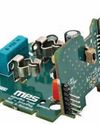How To Use GENETIC ALGORITHMS To Build Efficient MACHINE LEARNING MODELS
Electronics For You
|May 2025
Genetic algorithms (GAs) are optimising various stages of a machine learning pipeline, focusing on data preparation and model tuning. By employing GAs, we can automate labour-intensive steps, including handling missing data, feature engineering, and hyperparameter optimisation. This step-by-step guide offers an end-to-end blueprint for building more robust and efficient machine learning models to maximise the value extracted from data.

In the age of Big Data, the amount of information we can collect and analyse is unprecedented. While this provides incredible opportunities for learning and growth, it also presents a challenge: How do we make the most out of this vast sea of data? Merely collecting data isn’t enough; what makes the difference is how efficiently we can process and analyse it. This is where genetic algorithms (GAs) come into play.
Genetic algorithms are optimisation heuristics based on the principles of natural selection. They offer a way to find good solutions to complex problems. In the context of machine learning, they can help us to fine-tune models for better performance and more effective data utilisation.
Here, we’ll explore how genetic algorithms can be employed to make your data work harder for you. From data preparation to model selection, we’ll look at how GAs can enhance each step of the machine learning pipeline.
Data-centric approach in machine learning
We live in times of data overload. That means we have to take a data-centric approach in machine learning. While algorithms and models often take the spotlight, the quality and efficiency of the data being fed into these models are just as critical—if not more so. Optimising the algorithms alone won’t yield the desired results if the data itself isn’t optimised. It’s akin to trying to make a delicious meal; even the best chefs can’t produce a culinary masterpiece with subpar ingredients.
So, what does it mean for data to be ‘efficient’? Efficiency in this context refers to maximising the useful information that can be extracted from a given set of data. This could involve eliminating redundant features, fine-tuning hyperparameters to better suit the specific data set, or even selecting a machine learning model that’s particularly well-suited for the data you have.
このストーリーは、Electronics For You の May 2025 版からのものです。
Magzter GOLD を購読すると、厳選された何千ものプレミアム記事や、10,000 以上の雑誌や新聞にアクセスできます。
すでに購読者ですか? サインイン
Electronics For You からのその他のストーリー

Electronics For You
Tech Majors Are Racing TOWARDS NET-ZERO - What About You?
Apple, Microsoft, Amazon, Google, Infosys, Wipro—global and Indian firms are heading closer to achieving net-zero emissions, a mandate to combat climate change. Here is what you need to know to start your journey...
12 mins
December 2025

Electronics For You
Miniature IoT WATER TDS And LEVEL MONITOR Cum CONTROLLER
For setups that rely on stored water, clear awareness of tank level and water quality is essential.
3 mins
December 2025

Electronics For You
The Impact Of GENERATIVE AI On The Future Of AUTOMOTIVE AND EVs
Autonomous vehicles, connected ecosystems, and smart factories are only the beginning. Generative Al is pushing the auto industry beyond predictions into a bold era of creativity-from EV design to real-time diagnostics and showroom automation. Here is how GenAl is reshaping innovation across the automotive value chain.
8 mins
December 2025

Electronics For You
How AI Tools Are Making SOFTWARE DEVELOPMENT BETTER
AI is reshaping how we code, debug, and collaborate. From Copilot to automation, it is changing software development in ways worth exploring.
3 mins
December 2025
Electronics For You
How AI Tools Are Making SOFTWARE DEVELOPMENT BETTER
AI is reshaping how we code, debug, and collaborate. From Copilot to automation, it is changing software development in ways worth exploring.
3 mins
December 2025

Electronics For You
5 Interesting Reference Designs FOR SMART HOMES
Smart home devices are transforming the way people interact with their appliances. They make homes more convenient, secure, and energy-efficient. From smart plugs and energy monitors to smart locks and thermostats, reference designs help design engineers create connected products that are easy to use, consume less power, and are reliable. These designs allow you to control devices remotely, track energy use, extend battery life, and automate routines. They provide practical solutions for upgrading homes and small commercial spaces without major modifications.
3 mins
December 2025

Electronics For You
Fancy USB LED VASE
This USB LED vase is a simple yet elegant device that fuses art with electronics to create a decorative lighting display. Powered directly from a standard USB port, it uses readily available components such as MOSFETs, resistors, capacitors, and LEDs to produce a striking, dynamic sequence of lights.
3 mins
December 2025

Electronics For You
"WHAT OTHERS SELL IN FOUR BOXES WE BUILT IN ONE"
Years of custom field work are shaping a product line with its own cloud, its own hardware, and a market that is now beginning to recognise its value.
8 mins
December 2025

Electronics For You
BUILD LARGE LANGUAGE MODELS
Large language models are machine learning models designed for a range of language-related tasks such as text generation and translation. Here’s how open source software can help you build your own large language model.
6 mins
December 2025

Electronics For You
Rare Earth Or Rare Ingenuity? India Remains Between The Two
With China firmly controlling rare earth exports, India confronts a critical moment in its technological trajectory.
8 mins
December 2025
Listen
Translate
Change font size

